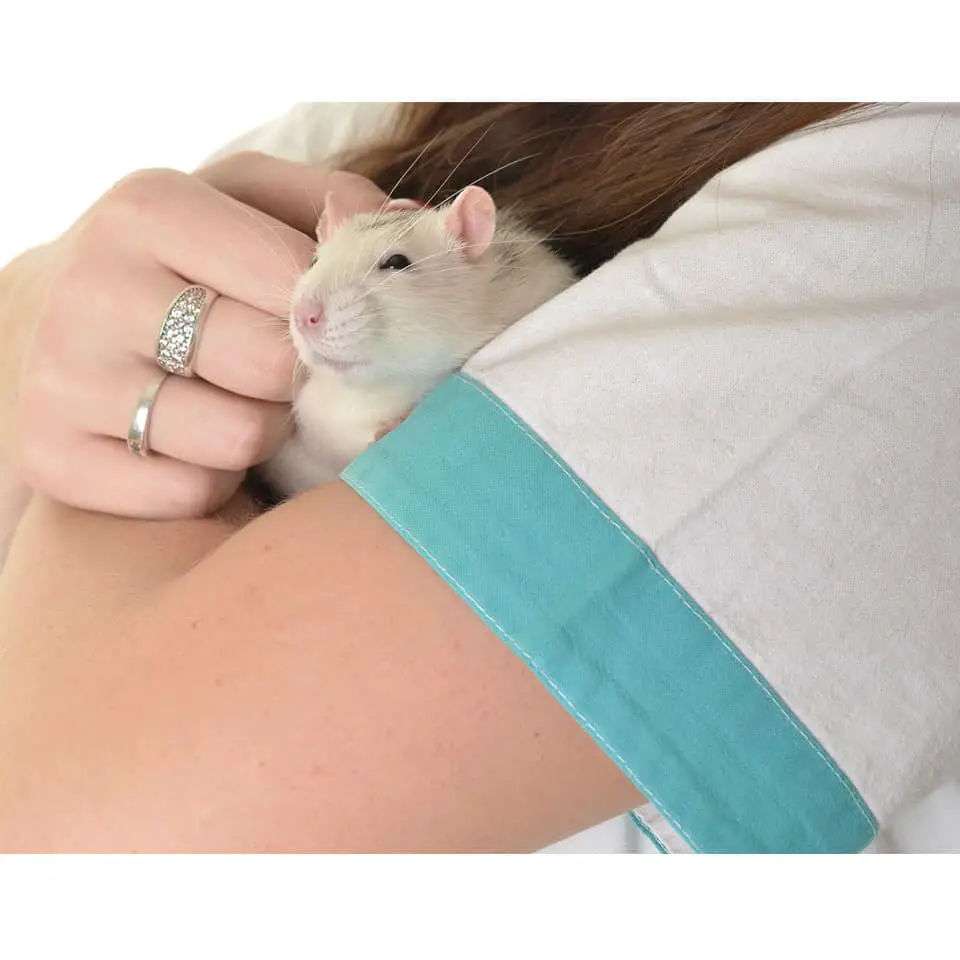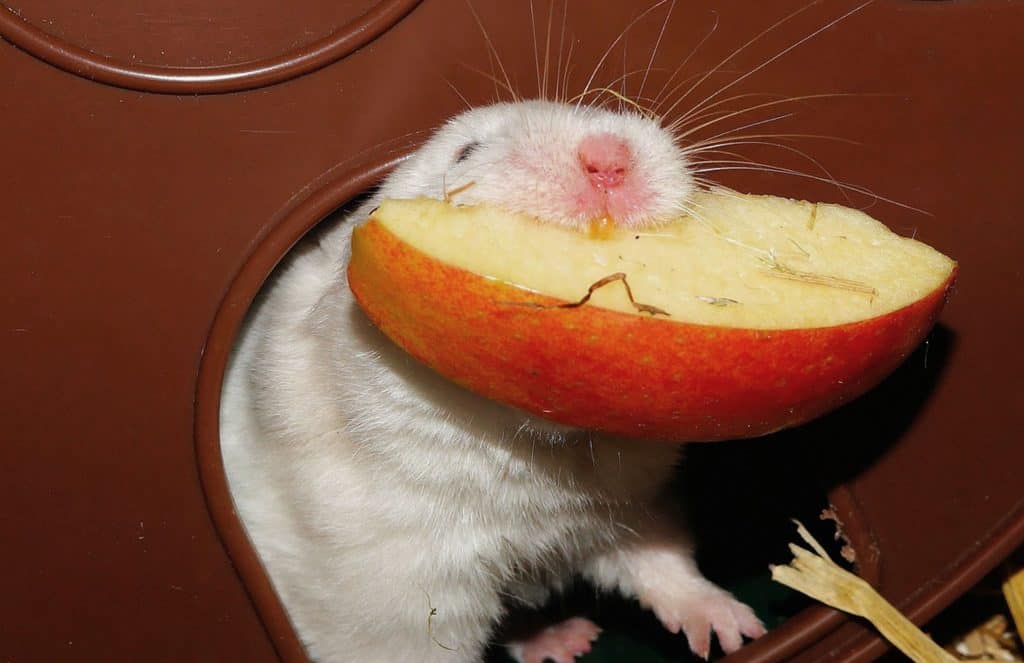Are rats good and safe pets for kids? It’s a question many parents ask when considering a new pet for their family.
Rats are often misunderstood creatures, largely due to their reputation as pests, but they can make great additions to households in the right circumstances.
Before deciding if a rat is a good pet for your family, it’s important to understand their needs and behavior.
Rats are social animals and require companionship, so it’s recommended to keep at least two together. They also need plenty of space to run and play and a diet consisting of fruits, vegetables, and high-quality rat food.
Regarding safety for kids, rats can be great pets as long as they’re handled gently and with care. Teaching children to handle rats properly can help prevent accidental bites or injuries. So let’s go over how to do all that, and why pet rats can be a great choice for your kids!
Why Pet Rats Are Ideal for Kids
Pet rats are suitable for children for various reasons. Firstly, they are low-maintenance pets that require minimal attention. They are affectionate and can bond easily with their human owners, allowing children to develop empathy, responsibility, and social skills.
Unlike larger pets, rats can adapt to smaller living spaces, making them a great option for families living in apartments or houses with limited outdoor space for a pet. Rats do not require extensive exercise and are happy to curl up in a warm lap for an evening of snuggles and attention.
Additionally, rats are intelligent creatures and can be trained to do tricks, making them fun and interactive companions for children.
They are also clean animals, grooming themselves regularly like cats. The gentle disposition of pet rats makes them a perfect pet for kids who are afraid of larger animals like dogs.
They are also easy to handle and are unlikely to bite. All in all, pet rats are a wonderful choice of pet for children, offering them the opportunity to learn about responsibility and care for another living being, while also providing a loving and loyal companion.
Low-Maintenance And Easy Care

If you are looking for a low-maintenance and easy-care pet, then pet rats might be the perfect option for you. Unlike cats and dogs, rats don’t require frequent grooming (at least, not on your part!) or exercise. They are quite independent and can entertain themselves with simple toys and activities.
They also don’t need expensive or complicated diets and can eat various fruits, vegetables, and grains. You can read more about feeding a pet rat here.
Cleaning their living quarters is also a breeze as they are mostly litter-trained and fastidious in tidying their space. Additionally, rats can adapt well to different living environments with enough space to play and explore.
Although they are small creatures, pet rats have a huge personality and bond closely with their owners.
They are social creatures and thrive on interaction and affection. So if you are looking for a low-maintenance pet that is easy to love and care for, consider adding a cute and furry pet rat to your family.
Gentle and Social Nature Of Pet Rats
Pet rats are an excellent choice for kids who like small and friendly animals. These furry creatures are known for their very gentle and social nature.
Unlike their wild counterparts, pet rats are domesticated and have been bred to be more friendly and less aggressive.
They love to interact with their owners and enjoy being held and cuddled.
They are also very playful and curious, making them fun pets to have around. Not only that, but pet rats are highly intelligent and can be trained to do various tricks and tasks.
They also have a great sense of smell, which makes them excellent at navigating through mazes and finding hidden treats, which can be a fun activity to do with your children!
Educational Opportunities For Kids
Pet rats can provide excellent educational opportunities for kids. By taking care of their pet rats, children can learn about responsibility and the importance of animal wellbeing.
Kids can also learn about the anatomy and physiology of rats, their dietary and housing needs, and behavior patterns, which can be applied to other animals.
Additionally, caring for pet rats can foster empathy, compassion, and emotional intelligence in children as they bond with their pets and observe their emotions and behaviors.
Overall, owning pet rats can provide a rich and exciting opportunity for children to learn, grow and develop.
Introducing Your Pet Rat to Kids
Introducing your pet rat to kids can be a fun and exciting experience for both the children and the rat.
It’s important to teach children how to handle rats respectfully and gently! So ensure they know to avoid squeezing or pulling on the rat’s tail or legs.
Encourage them to hold the rat in their cupped hands while supporting its feet and body. It’s also important to supervise the interaction between the children and the rat to ensure the rat’s safety.
To make the experience enjoyable for both the kids and the rat, let the children offer tasty treats and talk to the rat in a soothing voice. With time, your pet rat may become a beloved member of the family and a fun pet for kids to play with.
Teaching Children About Rat Behavior And Handling
Teaching children about rat behavior and handling pet rats is a great way to introduce them to responsible pet ownership.
First, it is important to explain the basics of rat behavior, including their social nature and need for exercise. Next, children should learn how to properly handle and care for their pet rats, such as providing them with a safe and comfortable living environment, giving them a balanced diet, and providing regular veterinary check-ups.
It is also important to educate children on appropriate handling techniques (which we’ll cover next), such as supporting their rats’ entire body when holding them and minimizing sudden movements.
By teaching children about rat behavior and responsible ownership, they can develop a deeper understanding and appreciation for these fascinating creatures, so take your time teaching them all they should know about pet rats!
Demonstrating Proper Holding Techniques

It’s important to handle pet rats properly to ensure their safety and comfort.
The first thing to remember is to approach your rat calmly with slow movements so as not to startle them.
When picking up your rat, always support their body with both hands and provide a secure hold around their midsection.
Never pick them up by their tail or limbs as this can cause serious injury.
It’s also important to let your rat come to you rather than forcing them to be picked up, as they may not be in the mood for handling at certain times. Always keep a watchful eye on your rat while holding them, and be careful not to squeeze them too tightly as this can cause serious harm.
Be calm and gentle when handling your pet rat, and be sure your children are doing it too!
Establishing Rules And Responsibilities For Kids
When it comes to owning pet rats, it’s important to establish rules and responsibilities for children. This not only ensures the safety and well-being of the rats but also teaches kids important lessons about caring for animals.
It’s crucial to keep the rats’ cage clean and sanitized regularly, as well as provide adequate food and water.
Children should be taught never to leave the cage open unsupervised, as rats can easily escape and potentially harm themselves. Additionally, it’s important to supervise interactions between the rats and other pets, as rats can be easily injured.
So basically:
- Teach your children to clean the pet rat’s cage routinely
- Always close the rat cage when they’re not handling the pet rats
- Keep them well-fed and with water
- Handle the pet rats with Care!
You can introduce these rules and responsibilities slowly, so you don’t overwhelm your children!
Bonding Between Kids And Their Pet Rats
Bonding between children and their pet rats is very important! So here are a few ways you can help your kids keep a close connection with their pet.
1. Spend time with them: Make sure that your children spend plenty of quality time with your pet rats. Talk to them, play with them, and give them plenty of attention. This will help build a strong bond between your kids and their pet rats.
2. Give them treats: Giving pet rats treats is a great way to bond with them. Rats love treats such as fresh fruits and vegetables, seeds, or nuts. As you give them these treats, they will begin to associate you with positive things and trust you more. (be sure to not let your children give them too many though, or they might become very fat and develop health problems!)
3. Train them: Training your pet rats is not only a great way to teach them new skills, but it also helps to strengthen the bond between you and your pets. Help your children start with basic training such as teaching them to come to you when you call their name, teaching them to sit, or even teaching them tricks like jumping through hoops.
4. Provide them with a safe and comfortable home: A safe and comfortable environment is important for your pet rats to feel happy and secure. Ensure their cages are clean, spacious enough, and full of toys and comfortable places to sleep. This should be one of your kids responsibilities, as we’ve mentioned before!
5. Grooming: Grooming your pet rats is a great way to bond with them. Let your kids brush their fur, trim their nails, and give them a bath regularly. This will make them feel loved and cared for.
6. Respect their boundaries: Just like humans, rats have their own personal space and preferences. Remember your children to respect them by not forcing them to do anything they don’t want, such as being held or petted. Over time, they will learn to trust your kids and let them into their personal space.
Preventing Pet Rat Injuries And Common Misconceptions
When it comes to pet rats, some common misconceptions need to be addressed.
One of the concerns is the potential for injuries. However, with proper care and handling, the risk of injuries can be minimized.
It’s crucial to teach children how to handle rats gently and avoid rough play. Educate them about the proper techniques for holding and interacting with pet rats, ensuring they understand the importance of being calm and gentle.
By promoting responsible and supervised interactions, the chances of pet rat injuries can be significantly reduced.
Pet Rat Allergy
One common misconception surrounding pet rats is the assumption that they are a common allergenic pet.
However, the truth is that pet rats are generally considered hypoallergenic. Unlike cats or dogs, rats produce fewer allergenic proteins and are less likely to trigger allergic reactions in individuals prone to allergies.
It’s essential to educate parents and children about this fact, dispelling the misconception that pet rats are problematic for individuals with allergies.
Nevertheless, it’s always advisable to have a trial period and observe any potential allergic reactions before fully committing to a pet rat.
Preventing Bites From Pet Rats

Concerns about pet rat bites are often raised, especially when considering them as pets for kids.
But these risks can be minimized, as we mentioned before!
It’s important to teach children not to provoke or mishandle rats, as they may bite in self-defense.
Encourage children to approach rats calmly and avoid sudden movements or loud noises.
By promoting respectful and gentle interactions and closely supervising younger children, the chances of bites from pet rats can be greatly reduced.
Pet Rats And Bathing
Unlike some other pets, such as dogs or cats, pet rats do not typically require frequent baths.
In fact, rats are known for being meticulous groomers and do an excellent job of keeping themselves clean. Excessive bathing can strip their skin of natural oils and lead to dryness or other skin issues.
However, there are situations where a bath may be necessary, such as if the rat gets into something dirty or sticky. If bathing is required, it’s crucial to use lukewarm water, rat-safe shampoo, and ensure a gentle approach. You can even make your own homemade pet rat shampoo and bathe them in it!
Proper drying and avoiding drafts afterward are also essential to prevent chill or discomfort.
Alternative Small Pets For Kids
While rats make wonderful pets for kids, be sure to explore other small pet options as well.
Each child has unique preferences and needs, so considering alternative pets can be beneficial.
Here are a few popular choices that offer different characteristics and care requirements.
Hamsters
Hamsters are adorable and relatively low-maintenance pets, making them an attractive option for kids.
They are solitary animals that require their own individual enclosures. With their small size, they are easy to handle and can provide hours of entertainment with their energetic nature.
Hamsters are primarily nocturnal, so it’s important to consider this aspect when choosing them as pets for kids who may prefer daytime interactions.
Guinea Pigs
Guinea pigs are gentle and sociable pets that thrive in the company of humans and other guinea pigs.
They are larger than rats and hamsters, making them easier for kids to handle and interact with. Guinea pigs have distinct personalities and enjoy being part of the family.
They do require spacious enclosures, a balanced diet of fresh vegetables and hay, and regular social interactions to keep them happy and healthy.
Gerbils
One popular alternative to rats is gerbils. Gerbils are small, sociable rodents that can provide hours of entertainment for children.
They are known for their playful nature and active behavior, making them captivating companions. Gerbils are relatively easy to care for, requiring a similar habitat setup to rats.
They thrive in pairs or small groups, so consider adopting more than one gerbil to ensure they have companionship. However, it’s important to note that gerbils have different care needs and temperaments compared to rats, so proper research and understanding their requirements is essential before bringing them into your home as pets.
Related Questions
Let’s quickly cover some related questions you might have about pet rats!
What kind of cage is best for rats?
A wire cage made for small animals with multiple levels is ideal for rats. The cage should be large enough for rats to run around and play, with plenty of space for toys and hiding spots. It is important to have a solid bottom to the cage to prevent injury to their feet.
Here are a few examples, with different cage prices!
What should I feed my pet rat?
Rats should be fed a balanced diet that includes a variety of fruits, vegetables, protein, and carbohydrates. Commercial rat food is available and can be supplemented with fresh foods. Avoid feeding your rat cookies, spaghetti, and toilet paper, which can be harmful. You can read more about creating a healthy pet rat diet here.
How often should I clean my rat’s cage?
Cleaning the cage once a week is recommended to keep it hygienic and prevent odors. This involves removing all litter and bedding, washing the cage and accessories with mild soap and water, and replacing with fresh litter and bedding.
Can rats litter train like cats?
Rats can learn to use a litter box, but it may take some time and patience.
Place a litter box in one corner of the cage and gradually move any soiled litter to the box. Reward your rats with treats when they use the litter box.
Here’s how you can litter train your pet rats step by step.
Do rats have a strong odor?
Rats do not have a strong odor if their cage is cleaned regularly.
However, male rats can have a musky scent that may be more noticeable.
Can rats be housed with other animals?
It is not recommended to house rats with other species, such as mice, rabbits, or snakes.
However, keeping two rats of the same sex and similar age together can benefit their social behavior.
I hope this article has helped you make a decision about getting a pet rat for your children! If you need a few more reasons, here are some amazing pet rat facts to fall in love with!




